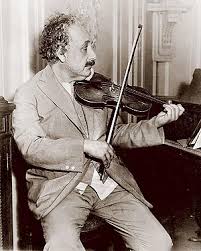Japan and gyroscopes, refrigerators and impressionistic travel writing – these are not topics one would associate with Albert Einstein. Nor does the following sound like the master of time and space: “The prospect of a downright normal, natural life in tranquillity, connected with the welcome practical employment in the factory, enchants me. Add to that the wonderful countryside, sailing – enviable.” This was a response to the offer by Einstein’s friend, the inventor and businessman Hermann Anschütz-Kaempfe, of work and a home in Kiel, away from pressures that plagued him in Berlin after the first world war.
The joy of the Collected Papers, which has now reached the 13th volume and the year 1922, is that it reveals these lesser known facets of this extraordinary man, allowing us to go beyond the famous mask. “Mild, intoxicating air. Steel-colored sea. Italian suggestion of solid ground diffusely cloudy. Japanese woman crawling about with children. They look rosy and bedazzled, almost as if (schematic) stylised. Black-eyed, black-haired, large-headed, pattering.” This is from the lengthy travel diary of 1922/3, and presents an unfamiliar figure, to say the least: an Einstein who sounds more like a painter taking notes for a composition.
As Kevin Jackson has pointed out in Constellation of Genius, 1922 was Modernism Year One; both The Waste Land and Ulysses were published that year. Scientific and artistic modernism were more or less contemporaneous, although on the Jackson principle, Modernist Science Year One would have to be 1905, Einstein’s annus mirabilis when, in the space of three and a half months, he wrote three epochal papers, one of which won him the Nobel prize, one confirmed beyond all doubt the existence and size of atoms, and the other introduced the mind, space and time-bending concept of special relativity.
The label Modernism Year One sits uneasily on Germany in 1922, where the reaction against all things modern, Jewish and left-wing was beginning to congeal into the horror that would emerge as Nazism. Einstein, the man who, just as much as Picasso or Stravinsky, ushered in modernism, knew this only too well.
The German republic, formed after Germany’s defeat and the Kaiser’s abdication in 1918, faced enormous economic and political problems, as the war’s victors sought unfeasibly large reparations. Hitler had already been installed as leader of the Nazi party in Munich in the summer of 1921. On 24 June 1922, in a portent of what was to come, the foreign minister Walter Rathenau was assassinated by right-wing extremists. Rathenau was Jewish and had just signed the Rapallo treaty with communist Russia. Einstein was friendly with Rathenau and was deeply affected by the killing. As a lifelong pacifist and self-proclaimed “international person”, he had been horrified at the extreme nationalistic mania engendered by the war even among scientific colleagues.
In October 1914, 93 leading German intellectuals, including some of Einstein’s closest colleagues such as Max Planck, signed a declaration, “Call to the Civilised World”, popularly known as the “Manifesto of the 93”, which denied all allegations of German atrocities in the invasion of Belgium in 1914. Einstein was involved in a counter manifesto, approaching various Prussian Academy luminaries for support, and was completely unsuccessful, lamenting: “Only men of extraordinary independence of character seem able to resist the pressure of prevailing opinion. There does not seem one single man of that calibre in the Academy.”
After the experimental vindication of Relativity in 1919, science itself had become a battleground, with some German physicists, led by Philipp Lenard, rejecting Relativity in favour of “sound German spirit”. In 1921 Lenard had written a book, Ether and Unether, expressing these views, and Hitler had written an article stating: “Science, once our greatest pride, is today being taught by Hebrews, for whom … science is only a means towards a deliberate, systematic poisoning of our nation’s soul.” Lenard was to become Hitler’s “Chief of Aryan Science”.
For a supposed ivory-tower scientist, Einstein had an impressive record of social and political engagement. Later, in 1933, soon after arriving in America as an exile from Nazism, he instigated the foundation of theInternational Rescue Committee, still flourishing and soon to be headed by David Miliband. He also worked hard to help establish the Hebrew University of Jerusalem. In 1921 he toured America with Chaim Weizmann (later to be Israel’s first president), drumming up support for such Zionist causes. But he had reservations, writing to his great friend the Dutch physicist Paul Ehrenfest: “The Zionists are shameless and importunate; I have a hard time adopting the appropriate position in each instance, considering that I am, of course, well-disposed to the cause.” Einstein could not escape being regarded as a figurehead for world Jewry, but he did reject the post of President of Israel when it was offered in 1952.
In 1922, Einstein’s peace activism took the form of joining the League of Nations committee on intellectual cooperation, but he knew he did not possess the negotiation skills essential to political life, and all his attempts at such intervention led to frustration. He resigned from the committee in July, only to rejoin and then leave for good in March 1923. Of this first resignation he wrote to Marie Curie: “I perceived that very strong anti-Semitism prevails among those I to some extent have to represent at the League of Nations; and generally there is a mentality that makes me unsuited to be the representing and intermediary person.”
When he was warned, following Rathenau’s murder, that his own life might be in danger, he decided that, whatever his long-term plans, he would spend some time away from Germany. From October 1922 to March 1923 he toured, principally in Japan at the invitation of his Japanese publisher. Japan might seem an unlikely home-from-home for a German Jew, but Einstein was entranced by the delicacy of Japanese art and architecture, the grace of the people, the social cohesion.
He believed in a culture of aesthetic and moral harmony that clearly did not exist in Germany. He found Japanese music somewhat wanting, because the element of harmony that coursed through and gave impetus to western music was missing, but the people, the architecture and the social climate he found enchanting, declaring: “For the first time I have seen a healthy human society whose members are absorbed in it.” All of this would, within a decade, curdle, and a brutalised Japan would become an ally of Nazi Germany. But this does not invalidate Einstein’s verdict on the culture he observed.
The journey also took in brief visits to Barcelona, Shanghai, Singapore and Hong Kong, ending in Palestine. He found the voyage, during which he was free of the many pressures of Germany, stimulating for his science, and the procession of scenes from so many un-Germanic places brought out the aesthete in him. So absorbing was the experience that the award of the Nobel prize, the ceremony for which he missed because of the trip, went unmentioned in his diary.
Einstein was a man of broad culture: music was always vital to him, and even in the hurly-burly of his early fame, when, as he said, “the great crowd seized possession of me”, he managed to arrange to play his violin in string quartets with musical friends. Fame meant that he could try to advance causes he believed in, such as international scholarly and scientific collaboration. But left to himself, he valued above all his circle of friends, mostly from his days in Switzerland.
He was a theorist, who did his greatest work while a patent clerk with no access to a laboratory. He is famous for his thought experiments, not hard, bench-top, real-time experiments. So he has become the epitome of the unpractical thinker. His pacifism and physical appearance reinforced the image of an idealist dreamer. But Einstein was deeply interested in machines. In the 1950s he wrote: “I … never ceased to concern myself with technical matters. This was of benefit also to my scientific research.”
Einstein worked with Anschütz-Kaempfe on improved designs for ships’ gyrocompasses as a co-patentee. He also took out other patents, notably for a design of refrigerator (co-patentee Leó Szilárd, later to be the key founder of the Manhattan project to produce the atom bomb). The invention of fluorocarbons in 1928 meant that the Einstein-Szilárd fridge never caught on, but it is curious to contemplate that the theorist of relativity might well also have had an appliance in every kitchen.
In the 1922 papers we see the practical Einstein at work with Anschütz-Kaempfe in a patent dispute with the American Elmer Sperry concerning the gyroscope; Einstein gives expert witness in the patent hearings. Given his background in patents this is not so surprising, but it gives a frisson to hear him switch from debating space-time to urging Anschütz-Kaempfe to “plate the aluminium sphere with a more precious metal” or to find a means of “applying a layer of graphite”. This is trial-and-error work, as far removed as possible from contemplating whether or not “God plays dice”. Anschütz-Kaempfe wrote to Einstein’s colleague Arnold Sommerfeld, stating that “weary of Berlin and everything connected with it”, Einstein “wants to go into technology”.
One technology he never went into, although popular myth suggests otherwise, is nuclear fission. The equation E=mc2 proposes the enormous energetic potential of matter, but only in the most general way. Einstein’s scientific biographer wrote that “to say that this made possible the construction of nuclear weapons is like saying that the invention of the alphabet caused the Bible to be written”. What Einstein did do was use his influence to alert President Roosevelt to the danger that Germany would acquire an atom bomb.
Einstein’s genius didn’t lie in one over-developed faculty – as the crass researchers who stole his brain for analysis believed – but in a broader-than-usual range of competencies. He was mathematician, physicist, engineer, philosopher, musician and social and political activist, and he had a highly developed visual artistic sense. He attributed his findings to his intense “curiosity, obsession, and sheer perseverance”, claiming: “I myself have no special talents”. And he attributed his elucidation of relativity to his slow development, asking questions as an adult that children might toy with only to abandon as they grow up (he was 16 when he had the first intuition of the relativity paradoxes). Einstein is the classic example of a man who “hears a different drummer”. And he remained true to this: he stepped to the music he heard “however measured or far away”. And far away for him included the deepest recesses of space-time, a place no one before even knew existed.
• Nanoscience: Giants of the Infinitesimal by Peter Forbes and Tom Grimsey will be published in October.
• This article was amended on 24 June 2013. The original referred to Einstein’s journey ending in Israel. This has been corrected to Palestine.








